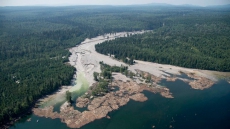Science marches on. Sometimes, it does so on fins.
Scientists at the University of Ottawa have studied the effect of a lifetime of walking on a certain type of fish. Yes, fish.
The results, say their paper in the journal Nature, suggest much about the evolution of complex pieces of anatomy such as arms and legs.
"What we wanted to pin down was: if you change the environment of this fish, does it change its behaviour or does its anatomy change?" said Emily Standen of the University of Ottawa.
Her team started with a fish called Polypterus. They have both lungs and gills and can live in water or on land. They also have lobelike fins, positioned so they can pull themselves awkwardly forward as if with stunted arms.
"Some people might say they're not as pretty as trout, but I think they're amazing," Standen said.
She and her colleagues took two groups of Polypterus, raising one in water and one on land. They found that by the end of the experiment, the land-raised group had indeed become more efficient walkers than their marine counterparts.
But more interestingly, the landlubbers' bodies had also changed. Bones that hooked to walking muscles had grown beefier. And just a subtle hint of what might be glancingly referred to as a neck had also emerged.
Even more interestingly, the changes seen in the walking group looked a lot like the changes seen in the fossil record as fish slowly evolved for terrestrial life.
"All of these changes mirror what we see in the fossil record," said Standen. "You see these changes in the bones suddenly over evolutionary time, mirrored by what's going on in this one individual."
Environmental changes had produced physical changes — a key finding regarding what scientists call plasticity, the "wiggle room" allowed for in every organism's DNA.
"What it's telling us is the plasticity, or the variation that's hidden within all of us, relates to the evolutionary process because what it allows animals to do is exist in novel environments," Standen said.
"When you change an environment and (an organism) responds in this plastic way, adaptive selection and evolution has something upon which to act."
The whole issue of plasticity is a hot one for evolutionary biologists, Standen said. The amount of its influence over evolution or how traits that appear in individuals become "fixed" into an entire species is still mysterious.
But it could help explain why evolution can come up with solutions so quickly.
"If you've got this variation within you, you don't have to wait for random advantageous mutation to occur to allow you to do something new," Standen said.
"You can use your plasticity to do that new thing, evolution can then act on that existing building block, and that combination allows you to explain how really complex changes can occur in a really short time."
Standen said she hopes to be able to keep using Polypterus to answer those questions.
"It is dream to be able to breed these, to be able to take it to the next step and do generation after generation and see how far does this go and how fast does this go. Can you get this to fix, somehow?
"It is fascinating."
Photo Courtesy- The Telegraph






